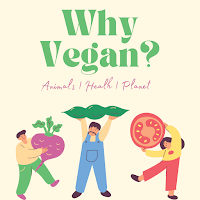The vegan way of living is a compassionate way to live that supports and preserves life, supports justice and equality, and promotes liberty.
The Vegan Project - Veganism is a lifestyle that is often misunderstood or misinterpreted. Some people think it's just a diet, while others see it as an extreme way of living. But at its core, veganism is a philosophy and a way of life that seeks to promote compassion, empathy, and kindness towards animals, humans, and the environment
The word "vegan" was invented by Donald Watson, the founder of the U.K. Vegan Society. He was born in 1910 and died at the age of 95 in his home in Northern England. In 1944 he got together with a group of friends to find a word that would describe their diets. He suggested "vegan", using the first three and last two letters of "vegetarian". It was the "beginning and end of vegetarian".
According to the Vegan Society, veganism is "a philosophy and way of living which seeks to exclude—as far as is possible and practicable—all forms of exploitation of, and cruelty to, animals for food, clothing or any other purpose; and by extension, promotes the development and use of animal-free alternatives for the benefit of animals, humans and the environment. In dietary terms it denotes the practice of dispensing with all products derived wholly or partly from animals." Continued below the video...
Why Vegans Want You To Be Vegan
The key phrase in this definition is "as far as is possible and practicable." This means that while vegans strive to eliminate all forms of animal exploitation and cruelty, they acknowledge that it's not always possible or practical to do so. For example, a vegan may use a medication that contains animal products because there are no alternatives available, or they may have to use a leather seat on public transportation because there are no other options.
This phrase is important because it highlights the flexibility and practicality of veganism. It acknowledges that we live in a world where animal products are pervasive and often difficult to avoid and that the goal of veganism is to do as much as possible to reduce animal suffering and exploitation.
So why do people choose to go vegan? There are many reasons, but the most common ones include concerns about animal welfare, health, and the environment. Vegans believe that all animals deserve to be treated with kindness and respect, and that using them for food, clothing, or any other purpose is inherently cruel and unjust. They also believe that a plant-based diet is the healthiest option for humans, and that animal agriculture is one of the leading causes of environmental degradation.
In conclusion, veganism is a way of life that seeks to promote compassion, empathy, and kindness towards animals, humans, and the environment. It's a flexible and practical philosophy that acknowledges that eliminating all forms of animal exploitation and cruelty is not always possible or practical. If you're interested in learning more about veganism, there are many resources available online, including the Vegan Society, Vegan Outreach, and PETA.
Sources:
- Vegan Society: https://www.vegansociety.com/go-vegan/definition-veganism
- Vegan Outreach: https://veganoutreach.org/
- PETA: https://www.peta.org/


Comments
Post a Comment
We welcome your input!